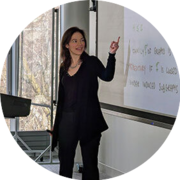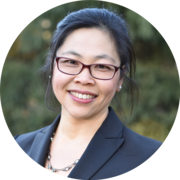- About MAA
- Membership
- MAA Publications
- Periodicals
- Blogs
- MAA Book Series
- MAA Press (an imprint of the AMS)
- MAA Notes
- MAA Reviews
- Mathematical Communication
- Information for Libraries
- Author Resources
- Advertise with MAA
- Meetings
- Competitions
- Programs
- Communities
- MAA Sections
- SIGMAA
- MAA Connect
- Students
- MAA Awards
- Awards Booklets
- Writing Awards
- Teaching Awards
- Service Awards
- Research Awards
- Lecture Awards
- Putnam Competition Individual and Team Winners
- D. E. Shaw Group AMC 8 Awards & Certificates
- Maryam Mirzakhani AMC 10 A Awards & Certificates
- Two Sigma AMC 10 B Awards & Certificates
- Jane Street AMC 12 A Awards & Certificates
- Akamai AMC 12 B Awards & Certificates
- High School Teachers
- News
You are here
Joint Mathematics Meetings

Join us at the 2024 Joint Mathematics Meetings, January 3-6 2024 in San Francisco, CA! MAA is proud to present several sessions at this year's JMM, including the sessions listed below. Register today!
MAA Sessions at the 2024 Joint Mathematics Meetings
MAA-AMS-SIAM Gerald and Judith Porter Public Lecture
What Makes a Problem Hard?
Saturday, January 6, 2024, 3:30 p.m.- 4:35 p.m.
Maria Chudnovsky, Princeton University
Abstract
Graph theory is a powerful mathematical tool for modeling real life situations. But once the model is built, how useful is it for finding a solution? The answer depends on how complicated the graph we have constructed is. What makes a graph complicated and when is finding a solution difficult? There are many possible answers to this question; in this talk we will discuss some of them. We will start with a brief overview of the history of the subject. No prior knowledge of graph theory is assumed.
MAA-SIAM-AMS Hrabowski-Gates-Tapia-McBay Lecture
When Mathematicians Don't Count
Friday, January 5, 2024, 9:00 a.m.- 10:05 a.m.
Kamuela E. Yong, University of Hawaii West Oahu
Abstract
A systemic issue of Indigenous invisibility within the mathematical community persists, rooted in practices that obscure Indigenous individuals in demographic data. Whether through aggregation with broader groups, categorization as "other," or complete omission due to identifiability concerns, they remain statistically invisible. This not only impedes accurate representation but also perpetuates the false narrative that mathematics is devoid of Indigenous presence.
Simultaneously, Indigenous voices remain critically absent within educational spaces.
In this talk, I will not only address these challenges but also share our ongoing efforts to build a thriving community of Indigenous mathematicians. Furthermore, I will discuss my personal journey in transforming my curriculum, infusing it with examples of ancestral knowledge and Indigenous perspectives integrated into mathematical concepts.
By shedding light on these issues and offering actionable strategies for change, this presentation seeks to inspire hope and promote a more inclusive and welcoming environment for Indigenous individuals within the mathematical community.
MAA Lecture on Teaching and Learning
(Why) To Build Bridges in Mathematics Education
Thursday, January 4, 2024, 11:00 a.m.- 12:00 p.m.
Yvonne Lai, Milton E. Mohr Associate Professor, Department of Mathematics, University of Nebraska-Lincoln
Abstract
It can be easy to silo ourselves with those that think "like us". This is the opposite of what we want to do if we want to be better teachers. In this talk, I will use the case of designing courses for prospective high school mathematics teacher to argue for the value of building bridges in mathematics education. Along the way, I will discuss recent work that examines the cost of uncivil discourse in mathematics education. I will conclude with examples and suggestions for bridge building in mathematics teaching, departmental structuring, and writing policy for the mathematical sciences community.
Speaker Biography
Yvonne Lai is an expert in the field of Mathematical Knowledge for Teaching. Her current research program seeks to improve the education of secondary mathematics teachers and early mathematics majors by bridging disciplinary perspectives from mathematics and education. She has been an investigator or co-investigator on projects receiving a total of nearly $8M in funding. Her collaborators include those from The Algebra Project, the Educational Testing Service, and the Association of Public and Land-Grant Universities. Lai currently chairs the MAA’s Committee on the Mathematical Education of Teachers, and she founded the MAA's Special Interest Group on Mathematical Knowledge for Teaching, an organization with now over 200 members, to support mathematics faculty invested in teacher education. Her PhD from University of California, Davis, was in hyperbolic geometry and geometric group theory, and she held postdoctoral positions in the Department of Mathematics and subsequently the School of Education at the University of Michigan.
More MAA Sessions at the 2024 Joint Mathematics Meetings
SIGMAA on Mathematical and Computational Biology Special Session
Undergraduate Research Activities in Mathematical and Computational Biology, I
Wednesday, January 3, 2024, 8:00 a.m.- 12:00 p.m.
Undergraduate Research Activities in Mathematical and Computational Biology, II
Wednesday, January 3, 2024, 1:00 p.m.- 5:00 p.m.
Undergraduate Research Activities in Mathematical and Computational Biology, III
Saturday, January 6, 2024, 8:00 a.m.- 11:30 a.m.
SIGMAA on Undergraduate Research Special Session
Navigating the Benefits and Challenges of Mentoring Students in Data-Driven Undergraduate Research Projects, I
Friday, January 5, 2024, 1:00 p.m.- 5:00 p.m.
Navigating the Benefits and Challenges of Mentoring Students in Data-Driven Undergraduate Research Projects, II
Saturday, January 6, 2024, 1:00 p.m.- 4:30 p.m.
SIGMAA on Mathematics and the Arts Professional Enhancement Program (PEP)
Visualizing Projective Geometry Through Photographs and Perspective Drawings, Part A
Thursday, January 4, 1:00 p.m. - 3:00 p.m.
Visualizing Projective Geometry Through Photographs and Perspective Drawings, Part B
Friday, January 5, 1:00 p.m. - 3:00 p.m.
SIGMAA on the Philosophy of Mathematics Guest Lecture and Discussion
Friday, January 5, 2024, 5:30 p.m.- 6:30 p.m.
MAA Project NExT Workshop for Current Cohort
Wednesday, January 3, 2024, 8:00 a.m.- 10:00 a.m.
MAA Project NExT Making Student Thinking Visible with Team-Based Inquiry Learning (Open to Everyone)
Wednesday, January 3, 2024, 4:30 p.m.- 5:45 p.m.
MAA Project NExT Classrooms Meet the Future: How Modern Technology Is Enhancing the Classroom Experience of Mathematics (Open to Everyone)
Thursday, January 4, 2024, 9:30 a.m.- 10:45 a.m.
MAA Project NExT Active Learning Strategies for a Large Class (Open to Everyone)
Thursday, January 4, 2024, 3:30 p.m.- 4:45 p.m.
MAA Project NExT Panel Discussion on Diversity, Equity, and Inclusion Practices in an Undergraduate Math Class (Open to Everyone)
Friday, January 5, 2024, 1:00 p.m.- 2:15 p.m.
MAA Project NExT Fostering a Growth Mindset in the Classroom (Open to Everyone)
Friday, January 5, 2024, 4:00 p.m.- 5:15 p.m.
MAA Reception: Celebration of Project NExT and Special Interest Groups of the MAA (Open to Everyone)
Friday January 5, 2024, 8:00 p.m.-10:00 p.m.
Golden Gate C1&2, Marriott Marquis San Francisco
MAA Project NExT Setting a New Standard: Implementing Standards-Based Grading (Open to Everyone)
Saturday, January 6, 2024, 8:30 a.m.- 9:45 a.m.
Full conference program and registration information can be found at jointmathematicsmetings.org. For more MAA session information, including details for Project NExT and SIGMAA-sponsored sessions at the Joint Meetings, please click here.







